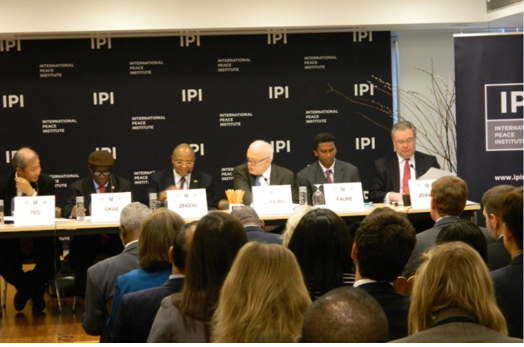
The role of international collaboration in the fight against piracy in the Horn of Africa as well as the remarkable example of Seychelles in tackling piracy comprehensively, were commended during a counter-piracy workshop held in New York on 10th October 2012. The workshop had the topic of "Combating Piracy: Experiences in the Gulf of Guinea, Horn of Africa and Southeast Asia" and was co-hosted by the Permanent Missions of Benin, Australia and the International Peace Institute. Seychelles was represented by the Secretary of State in the President's Office, Ambassador Barry Faure.
In this context, several speakers and participants referred to Seychelles' efforts in building a robust criminal justice system, in fighting piracy at sea, in raising the matter at the highest diplomatic level, and in initiating various regional and international initiatives, the Regional Anti-Piracy Prosecution and Intelligence coordination Centre (RAPPICC) being the most recent development. The meeting learned that no single country in the world had put most effort in combatting piracy than Seychelles.
It is to be noted that in 2009, following the wave of pirate attacks in the Indian Ocean region, President James Michel called on all regional partners and countries with interests in the region to come together to fight this scourge through a coordinated approach.
This call has been heeded by many countries that have enhanced their cooperation with Seychelles either through existing agreements or through the signature of new Status of Forces Agreements. More recently, in December 2011, President James Michel made an appeal to world leaders to give more attention to the situation in Somalia as a matter of urgency, following the increase in piracy attacks and recruitment of pirates that are ‘better armed, better organized and prepared to resort to more desperate measures.’ The response has been positive and wide-reaching, and as a result has seen a more comprehensive approach to the piracy threat by the world community.
The workshop was one of the rare occasions when the global phenomenon of piracy brought together the three regions most affected by piracy: Southeast Asia, the Horn of Africa, and the Gulf of Guinea. The event build upon the outcomes of the July 2012 Perth Counter-Piracy Conference hosted by the Government of Australia. The participants included approximately 120 people, including representatives from Member States (both military and civilian), non-government organisations and UN Secretariat staff. Newly accredited Seychelles Permanent Representative to the UN Ambassador Marie-Louise Potter and her deputy, Minister Counsellor Selby Pillay, also attended as participants.
The Workshop, which opened by Warren Hoge, IPI's Senior Advisor for External Relations, was co-chaired by Australian Permanent Representative to the UN Ambassador Gary Quinlan and Benin's Permanent Representative to the UN Ambassador Jean-Francis Zinzou. Apart from Ambassador Barry Faure, the other speakers were Mr Peter Jennings, Executive Director, Australian Strategic Policy Institute; LTC (Retd) Nicholas Teo, Deputy Director of the Information Sharing Centre under the Regional Cooperation Agreement on Combatting Piracy and Armed Robbery Against Ships in Asia; MAJGEN (Retd) Charles Okae, Director of Peacekeeping and Regional Security, ECOWAS; and Mr Alan Cole, Counter-Piracy Programme Coordinator, UN Office on Drugs and Crime.
The Workshop considered efforts to combat piracy in each of the three hot spots, looking at national, regional and international approaches, and examined in particular how lessons from one region may be relevant to others. To name a few highlights of the Workshop, Southeast Asia's experience in setting up an information sharing centre was noteworthy and should be emulated as a best practice. The political will of the countries of the Gulf of Guinea to use their own limited resources to develop their regional military assets was commended.
The meeting also noted the need for Member States of the UN to develop a global strategy against piracy, noting that the African Union Summit of 2010 did propose such an initiative. The organisers and speakers resolved to follow up on the outcomes of the Workshop.